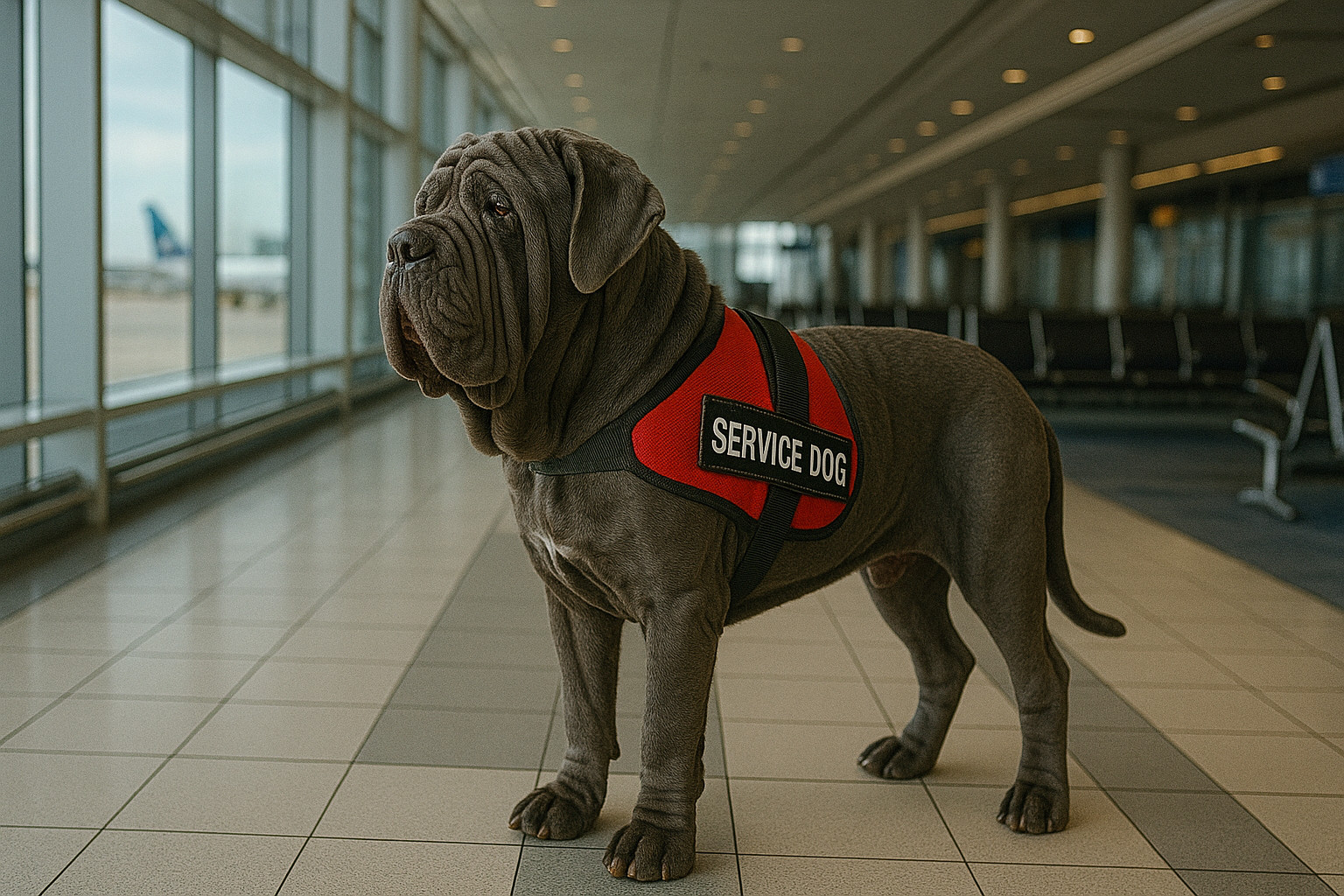Neopolitan Mastiff as a Service Dog
Get Your Documents

The Neapolitan Mastiff is a majestic and powerful breed renowned for its massive size and compelling presence. Known for their protective instincts and loyalty, these dogs have an extensive history as guardians. However, their potential as service dogs invites a comprehensive exploration to determine their efficacy and suitability in assisting individuals with disabilities.
Neopolitan Mastiff Overview
The Neapolitan Mastiff, or Mastino Napoletano, originates from Italy and has roots dating back to the ancient Roman Empire. Historically used as war dogs, as well as in gladiator arenas, their roles evolved into protective companions for families. As service dogs, they may not be a traditional choice, but their unique attributes offer distinct advantages and challenges worth discussing.
Physical Characteristics
The Neapolitan Mastiff is a large, muscular breed that commands attention. Adult males weigh between 110 to 155 pounds, while females can weigh 99 to 130 pounds. They stand about 24 to 31 inches tall at the shoulder. Their powerful build and massive head, with a characteristic set of pronounced jowls and loose skin, distinguish them from other breeds.
- Strength and Stamina: Their substantial physical power is beneficial in roles that require strength, such as mobility assistance for individuals needing physical support.
- Size and Space: Their large size necessitates ample living space and can pose challenges in urban environments or when using public transport.
Despite their size, the Neapolitan Mastiff is surprisingly agile, capable of maneuvering effectively when well-trained. However, their physical capabilities must be matched with proper training to ensure they can fulfill the demands of service work.
Temperament and Attitude
Known for their protective disposition, Neapolitan Mastiffs possess traits that can be both advantageous and restrictive as service dogs.
- Loyal and Protective: They are intensely loyal and form strong bonds with their owners, which can enhance their effectiveness in roles requiring vigilance and protection.
- Calm Demeanor: Despite their formidable appearance, they often have a calm and affectionate demeanor with their family, making them suitable for emotional support roles.
- Moderate Interaction with Strangers: Their inherently suspicious nature towards strangers requires diligent socialization to ensure they behave appropriately in public and stressful environments.
These attributes influence the types of service they can provide, requiring handlers to consider the breed’s need for substantial early training and socialization to function effectively in public settings.
Types of Service Work
Given the unique characteristics of the Neapolitan Mastiff, they can be suited to certain types of service work:
- Mobility Assistance: Their physical strength and size are beneficial for individuals requiring assistance with balance and mobility. They can provide stability and support, helping users navigate various terrains.
- Emotional Support: Their calm and loyal nature makes them suitable as emotional support animals, offering comfort to those with psychological conditions.
- Medical Alert and Protection Roles: Although not traditionally alert dogs, their protective instincts can serve well in environments where security and reassurance are additional needs for their handler.
Overall, while their skills are not suited for roles such as guide dogs for the visually impaired, their robust size and temperament can be channeled in areas where physical support is paramount.
Health Considerations
Neapolitan Mastiffs, like many large breeds, have specific health concerns that may impact their suitability as service dogs:
- Joint Health: Prone to hip dysplasia and arthritis, ongoing veterinary care and joint supplements are critical to maintain mobility and comfort.
- Skin and Coat Care: Their loose skin is susceptible to infections and requires regular cleaning.
- Gastric Torsion: This breed is at risk for bloat, a serious gastrointestinal condition; therefore, careful feeding strategies are essential.
These health issues emphasize the need for vigilant healthcare and a lifestyle that facilitates regular physical activity without overexertion.
Training and Suitability
The trainability of a Neapolitan Mastiff hinges significantly on the commitment and expertise of the handler:
- Intelligence and Independence: They are intelligent dogs but can possess a stubborn streak, requiring a firm and experienced trainer.
- Positive Reinforcement: Optimal results are achieved through positive reinforcement techniques and consistent, patient practices.
- Early Socialization: Exposure to a variety of environments, people, and animals from a young age helps in managing their protective instincts, making this a crucial step in their training regimen.
Their potential as service dogs depends heavily on meticulous training tailored to capitalize on their strengths while minimizing any breed-specific limitations.
Summary of Neopolitan Mastiff
Summarizing the potential of the Neapolitan Mastiff as a service dog reveals their unique strengths and challenges:
- Benefits:
- Physical Strength: Suitable for mobility and stability support
- Loyalty and Bonding: Form strong attachments, ideal for emotional support
- Protective Nature: Adds a level of security for their handlers
- Drawbacks:
- Large Size: Can be unwieldy in tight spaces or public settings
- Health Issues: Requires careful monitoring and proactive healthcare
- Training Needs: Demands experienced, patient handlers and trainers
- Ideal Roles:
- Mobility Assistance
- Emotional Support Animals
In conclusion, while the Neapolitan Mastiff is not a conventional choice for a service dog, their distinct characteristics present unique opportunities and challenges. With the right conditions, attentive training, and health management, these majestic creatures can indeed provide valuable service, particularly in roles that leverage their impressive physical attributes and loyal nature.
Get Your Documents
Example State Cards













